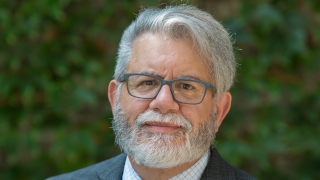College of Education and Human Services Moves Forward
Thursday, January 27, 2022

A History of Innovation
Seton Hall University's College of Education and Human Services (CEHS) has gotten out in front of the trend. A trailblazer in the field of online education, CEHS launched a series of web-based programs in the early 2000s. Two decades later, faculty have mastered the shift to remote teaching and students are actively engaging in rigorous learning delivered in live (synchronous) or recorded (asynchronous) formats.
Established over a century ago, CEHS offers 10 online graduate programs that serve as incubators for talent in fields such as higher education administration, teacher certification, law enforcement leadership, school and community counseling and K-12 education leadership. U.S. News and World Report recently took note, moving Seton Hall up more 50 places in its latest national rankings of online master's programs in education.
The University also captured fourth place among New Jersey institutions with comparable offerings. "The jump in our ranking is a clear measure of our success," notes the college's interim dean, Joseph Martinelli, Ed.D., who has taught online classes in instructional design and technology since 2015. "But this is just the beginning."
Expansion and Renewal
Beginning in 2021, CEHS has embarked upon an expansion and renewal of its graduate programs. The college offers 31 graduate and certificate programs, including several with summer, weekend and evening classes, making it easier for students to integrate their academic goals with the rest of their lives.
New Jersey, like other states, requires education professionals to meet certain teaching and supervisory requirements that demonstrate qualification and good standing. Students can select from 13 certification tracks leading to state licensure in special education, teaching English as a second language, counseling and administration, among other areas. The programs are approved by the New Jersey Department of Education and meet the standards for respective accreditation agencies in their related areas.
New Faculty
Four new faculty members will join the college this year to match the expansion of programming and a growing student body.
Martinelli senses "a renewed energy" among instructors who he says are focused on employing their best teaching strategies and following the latest currents in education, while remaining strongly connected to their students.
As the spring semester gets underway, 754 graduate students are working toward master's and doctoral-level degrees in education, counseling, psychology and law enforcement leadership. Among them are teachers and principals based at schools around the state and throughout the country. Some are career changers pursuing their dream of becoming educators who can support and inspire today's students. And there are those who want to become school counselors, lead as superintendents at the district level, or work in higher education.
Monica Burnette, Ph.D., began her career in higher education as an academic and admissions administrator at Cal Berkeley and Columbia before earning her doctorate in Higher Education Leadership Management and Policy at Seton Hall. Burnette now leads 18 student-focused departments as the Vice President of Student Services at the University. "The Ph.D. program at Seton Hall truly exceeded my expectations of what I could achieve as a doctoral candidate," Burnette says. "From applied research to education policy and on-the-ground experiences, I gained the knowledge, skills and confidence to lead at a higher level."
Accelerated and Interdisciplinary Degree Programs
The college is in the midst of restructuring a number of its programs to allow students to earn their graduate degrees in a shorter amount of time, another move aimed at complementing the changing demands of the marketplace. "The idea of going to grad school for two years is going away," Martinelli believes. "Students are looking for opportunities to earn their degree in a year or so. We are taking that into consideration as we reimagine our programs."
Another sign of change in the graduate education experience is the emergence of interdisciplinary programs. Seton Hall is in the process of creating graduate programs that, for example, may blend education leadership and communications. "Exciting new programs will be coming out soon. Whatever you're looking for," Martinelli notes, "you'll find it here."
Categories: Education






